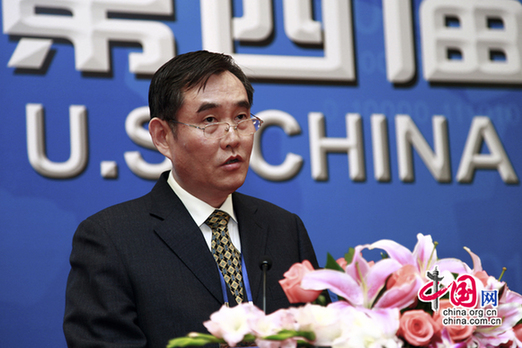Joining hands for a shared future in Internet expansion
By Qian Xiaoqian
Vice Minister of the State Council Information Office

Your Excellency Deputy Secretary of State Robert D. Hormats
Ambassador Jon Huntsman
Mr. Craig Mundie
Chairman Hu Qiheng
Ladies and Gentlemen,
On behalf of the China State Council Information Office, I would like to congratulate the joint efforts of the Chinese and American governments in holding the Fourth US-China Internet Industry Forum here in Beijing. This forum has played a crucial role in increasing the understanding between the two countries' IT enterprises, enabling the United States and China to reach some consensus on Internet and information technology-related subjects. Now, the forum serves as an important communication and cooperation platform for Chinese and American Internet companies and organizations. We at the State Council Information Office are also very grateful for the many efforts and contributions from Microsoft and the Internet Society of China.
Forums like this are important, now more so than ever before, especially following the financial crisis. The past year has been a tumultuous one, but China's economy has experienced steady growth, and its IT industries have maintained a quick development pace. Because of this success, China's IT sector has made many important achievements.
The tri-networks integration of telecommunications, cable TV and the Internet, as well as Wi-Fi development, has brought forth many new opportunities. China has initiated tri-networks trial operations in 12 cities, which are moving along smoothly. The number of Wi-Fi users across China is also increasing rapidly, opening up new market opportunities – and China's Internet industry is already busy implementing new strategies to take advantage of this growing Internet user base and market potential. Chinese IT companies are busy exploring and developing new technologies, new business models and new markets to innovate their content providing services and reform users' terminal services. So far, their achievements have been numerous.
Today, China's active capital market provides new financing channels for Chinese Internet enterprises. The emergence of the Growth Enterprise Board in October 2009 enabled many rising Internet enterprises to become listed companies. As these enterprises grow, so too does public interest and enthusiasm for the Internet and new information technology. This public support has helped enhance the sustained development and international competitiveness of China's Internet enterprises.
Cleaning up the Internet – that is, combating illegal and illicit content – is one of China's top priorities to guarantee a beneficial environment for the global communications network. Since the end of 2009, the Chinese government has cracked down on pornographic content on the Internet according to Chinese law. Illegal content circulation and actions have been punished to make the Internet safe and relieve parental and teacher concerns for young Internet users. These actions have gained the people's trust for the Internet and benefited the long-term development of the Internet in China.
China's basic policies on Internet development have been outlined in its recent white paper on Internet policy. The State Council Information Office's white paper on Internet development in China, published on June 8, 2010, looked back on the development process of the Internet in China over the years. The document made it clear that the government must accelerate the Internet's development through intensive application, scientific development, and governance according to law, all while protecting security interests. The basis of the policy is to spur Internet development and control, according to the law.
 0
0 







Go to Forum >>0 Comments